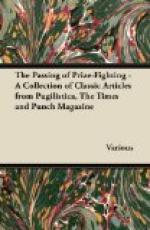“That there is no such
word as ‘imossible’ in his
dictionary.”—Canadian
Paper.
Correct.
* * * * *
“M. Polychromads,
Green Charge d’Affaires, has left London for
the Hague.”—Sunday
Times.
It is an unfortunate colour, but with a name like that he can always try one of the others.
* * * * *
“The canker of indiscipline
and the wine of liberty have
shaken the Russian Army to
its foundations.”—"Times”
Russian
Correspondent.
While the tide of new life that was kindled by the torch of revolution seems destined to crumble into dust.
* * * * *
THE TRIUMPHAL PROGRESS.
There are few phases of the War—subsidiary phases, side-issues, marginalia—more interesting, I think, than the return of the natives: the triumphant progress, through their old haunts and among their old friends, of the youths, recently civilians, but now tried and tested warriors; lately so urban and hesitating and immature, but now so seasoned and confident and of the world. And particularly I have in mind the return of the soldier to his house of business, and his triumphant progress through the various departments, gathering admiration and homage and even wonder. I am not sure that wonder does not come first, so striking can the metamorphosis be.
When he left he was often only a boy. Very likely rather a young terror in his way: shy before elders, but a desperate wag with his contemporaries. He had a habit of whistling during office hours; he took too long for dinner, and was much given to descending the stairs four at a time and shaking the premises, blurring the copying-book and under-stamping the letters. When sent to the bank, a few yards distant, he was absent for an hour. Cigarettes and late hours may have given him a touch of pastiness.
To-day, what a change! Tall, well-set-up and bronzed, he is a model of health and strength. His eyes meet all our eyes frankly; he has done nothing to be ashamed of: there is no unposted letter in his pocket, no consciousness of a muddled telephone message in his head. To be on the dreaded carpet of the manager’s room was once an ordeal; to-day he can drop cigarette-ash on it and turn never a hair.
“Oh yes,” he says, “he has been under fire. Knows it backwards. Knows the difference in sound between all the shells. So far he’s been very lucky, but, Heavens! the pals he’s lost! Terrible things happen, but one gets numbed—apathetic, you know.
“What does it feel like to go over the top? The first time it’s a rotten feeling, but you get used to that too. War teaches you what you can get used to, by George it does! He wouldn’t have believed it, but there—”
And so on. All coming quite naturally and simply; no swank, no false modesty.




